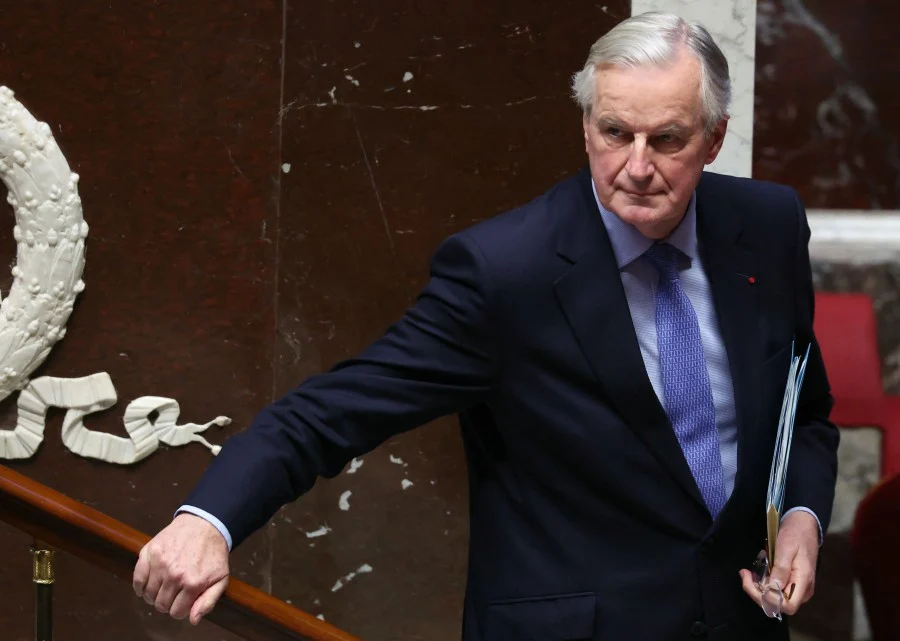
Barnier steps down as France’s Macron looks for a new prime minister
A day after opposition members voted to overthrow his government, Michel Barnier formally resigned, and French President Emmanuel Macron met with parliament leaders and supporters Thursday in an attempt to quickly select a new prime minister to succeed him.
Macron named Barnier, a seasoned conservative, prime minister just three months ago. He became the shortest-serving prime minister in contemporary French history when he was unable to garner sufficient support for a budget intended to reduce a large deficit.
According to the Elysee Palace, Macron requested that Barnier and his administration remain in a caretaker role until a new administration is established.
Macron intended to name a replacement quickly, according to three sources who spoke to Reuters on Wednesday. One of them stated that Macron wanted to do so before the reopening ceremony of Notre-Dame Cathedral, which had been restored following a horrific fire, on Saturday.
Among the world leaders anticipated to participate is Donald Trump, the president-elect of the United States.
The call for immediate action was echoed by Macron’s own allies. Barnier was appointed by Macron over two months after the snap elections in late June and early July.
The president of the National Assembly, Yael Braun-Pivet, told France Inter radio before meeting Macron at noon, “I recommend that he proceed quickly to the appointment of a prime minister, it’s important, we must not leave things up in the air.”
France now faces the possibility of concluding the year without a stable administration or a budget for 2025, despite the constitution permitting extraordinary procedures to prevent a government shutdown similar to that in the United States.
Just weeks before Trump takes office again, the political unrest in France exacerbates the European Union’s already dire situation following the fall of Germany’s coalition government.
Macron, who caused the issue by calling a disastrous snap election in June that resulted in the creation of the nation’s divisive parliament, is also diminished.
The nation was scheduled to hear Macron’s speech at 8:00 p.m. (1900 GMT).
The Le Parisien daily said that Francois Bayrou, whose name has been mentioned by French media as a potential Barnier successor, had lunch with the president. When asked whether the seasoned centrist had been chosen for the prime ministership, Bayrou’s adviser did not reply.
WEAKENING MACRON
In an attempt to complete a free trade agreement between the EU and Mercosur, European Commission President Ursula von der Leyen traveled to Uruguay as France faced the prospect of having to establish a new government for the third time this year. France has always opposed the agreement, and on Thursday, Macron’s administration restated its position.
Although a Toluna Harris Interactive poll for RTL broadcaster revealed that 64% of people now want the president to quit, Macron has not yet indicated that he will budge from calls for his resignation, even though his own tenure expires in 2027.
The far-right National Rally (RN) leader Marine Le Pen told TF1 TV, “Emmanuel Macron is the primary culprit for the current situation.”
One of the constitution’s never-used clauses states that a French president cannot be removed from office unless two-thirds of parliamentarians believe he has seriously failed to fulfill his duties.
In particular, approving a 2025 budget at a time when France needs to control its public finances will be one of the difficulties any incoming prime minister faces in navigating a divided parliament.
“This is the logical conclusion of what France, and its lawmakers are at the moment: a mess,” Paulo, 75, of Paris, told Reuters.
There cannot be a new legislative election until July, according to French constitutional law.
“Ongoing political uncertainty is likely to keep the risk premium on French assets elevated until potential new elections,” SocGen strategists wrote in a note. “Political uncertainty is likely to dampen both investment and consumer spending.”
Thursday’s surge in French stocks and bonds was attributed by some traders to profit-taking after the no-confidence vote’s widely anticipated outcome. Given the level of political unpredictability, however, the relief rally is unlikely to last.
According to Standard and Poor’s (S&P), a credit rating agency, France has no clear plan for lowering its fiscal deficit after the fall of its government, and less belt-tightening than anticipated is the most likely result.
All Categories
Recent Posts
Tags
+13162306000
zoneyetu@yahoo.com



